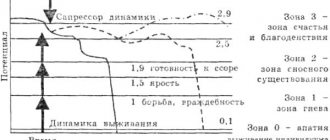The laws of management psychology operate regardless of external conditions, as a natural component of the management process. There are several such laws. Everyone matters to successful leadership. The subject of this article is the law of compensation.
Compensation acts as an additional effort in human activity. In psychology, it is a defense mechanism that works as an unconscious desire to overcome existing shortcomings and those that the person has only imagined. A defense mechanism is a psychological process necessary to mitigate or completely remove negative states: tension, worries, anxiety, when there is a conflict between the individual and external conditions. The concept itself was introduced by S. Freud in 1894 in one of his works devoted to neuropsychosis. Within adaptation theories, compensation is considered as a means of “restoring the disturbed balance of mental and psychophysiological processes by creating an oppositely directed reaction or impulse” [3, P. 271].
Overcompensation: the history of the origin of the term
The origin of this term is based on fictionalism, discovered by Hans Vaihinger. It lies in the idea that the practical majority of the planet's inhabitants build their goals and behavior based on false social concepts. This refers to the perception of any generally accepted norms and concepts that do not always have practical application or do not correspond to the real state of affairs.
One of these false statements is “all people are equal in their capabilities.” The term overcompensation itself appeared thanks to Alfred Adler, who introduced it into the scientific community. In his opinion, if a person follows the wrong path, then he has only two ways to achieve success. And the first of them is compensation.
Example of compensation
That is, any person strives to feel like a full-fledged member of society and does not want to be worse than others. Therefore, the psyche, trying to protect itself from the realization that the individual is worse in some way, forces him to compensate for this deficiency. And then he begins to develop those skills for which he has the most predisposition, in order to hide the missing experience and opportunities in others.
For example, a child noticed that he is in good physical shape, but he solves mathematical problems worse than others. And in order to somehow compensate for his difference from other students, he begins to develop in sports. As a result, after some time, his physical fitness results are amazing. But since he was already not strong in science, and also paid less attention to the development of this skill, the deficiency begins to cause difficulties in life. And the more he invests in sports, the more difficult it is for him to comprehend scientific knowledge, he will begin to study worse, will not keep up with the program, and so on.
What is compensation in psychology
The term compensation was introduced by Freud, and was further developed in the works of Adler, the founder of individual psychology, in which he considered compensation as a personality strategy.
The mechanisms of compensation and overcompensation in Adler's teachings were considered as key concepts.
Compensation in psychology is defined as an attempt to make up for missing personality traits, one’s physical or mental illness, real or imaginary.
Psychological compensation suggests that I try to make up for my deficiency, often in a different area.
Compensation in psychology examples: if I don’t know how to draw, then I start working hard on something that works better, for example, physics.
Overcompensation in psychology suggests that my efforts will be directed in the same area - I will begin to learn to draw even more diligently. The best clear example of overcompensation in psychology is the Paralympic Games, in which, through significant, exaggerated efforts, people achieve success in a physical area that is problematic for them.
Compensation in psychology is an important topic that affects not only the very mechanism of overcoming visible, objectively existing shortcomings, which relates to physical illnesses. But it also considers the characteristics of self-perception and the behavioral strategy chosen on the basis of this self-esteem, since compensation often concerns imaginary shortcomings, low, inadequate self-esteem.
Thus, a child who received an instruction from a kindergarten teacher that he is bad and accepted it, as often happens if other significant adults somehow confirmed this, at school, university, at work, can prove to others for the rest of his life that he is good. However, this does not solve the problem fundamentally; the protection mechanism only situationally reduces tension, but does not eliminate it.
Often the real reason remains unchanged inside, even protected from its resolution thanks to compensation - an adult man still feels bad, dissatisfied with himself. While he is tense and experiencing an acute phase of conflict with himself, and, as a consequence, with society, the psyche protects him through a compensation mechanism. When the tension decreases and resources are freed up for internal psychological work, a person thinks about the root of the problem, and at this stage can begin to solve it by turning to a psychologist for help.
However, the request can also be formulated in the opposite way - a person may experience difficulties in achieving his compensatory goals, blaming, for example, those around him for the inability to give him what he wants, for bad attitude. He will think that the problem is with those around him, or that he is a really bad, unworthy person. Therefore, the goal of the psychologist will be to lead a person to an understanding of the mechanism of his psyche according to the compensatory principle, revealing the actual cause and attempts to overcome it. As soon as a person stops feeling bad, psychological compensation will no longer be necessary. Thus, the compensation mechanism, like all types of psychological defenses, is not the right way to resolve the problem; it is aimed only at temporarily maintaining psychological balance and indicates trauma.
Compensation in psychology includes examples from life in women's behavioral strategies. An example would be a girl who, as a child, took on the role of being unworthy of something good, perceiving other people by default as superior to herself, worthy of receiving good things, but not herself. Therefore, she begins to implement this strategy, in her traumatic experience feeling unworthy in kindergarten, school, and in adulthood she can become a chief accountant in order to have a decent salary.
She developed a compensation that she should feel worthy, trying in every possible way to correspond to her lifestyle at a high level both in relationships and on social networks, choosing one from many photographs, and then processing it with filters. She will also try to choose worthy people in her environment, to get into high society, closed clubs, and receive status regalia.
But the harder she does this, the longer she implements a strategy designed only to compensate for her inner feeling of dissatisfaction, the more confirmation she finds that she is unworthy - by default - to be happy, loved, rich. She is trying to acquire symbols of worth, something for which she feels she will be rewarded. This includes plastic surgery, status training, expensive goods, and display of money. However, as they say, there are more and more telephones, but happiness does not come, and here she can think about the falsity of her strategy at the root, which is the first step towards healing.
Phenomenon among famous personalities
Vivid examples of this phenomenon are observed in many famous people. For example, Olga Skorokhodova lost her sight at the age of five, and over time she lost her hearing. But, trying to overcome complexes and feelings of inferiority, she graduated from Moscow State University and reached great heights in Soviet science, being a scientific defectologist.
Many consider her literary works on raising children with visual and hearing impairments to be a very important contribution to science.
The well-known works of the talented composer Ludwig Beethoven were written by him after losing his hearing at the age of 26. This is overcompensation in its direct manifestation, despite the presence of a serious defect, he still continued to work in the same field, trying to prove to himself that he had not become worse.
Psychological theories and schools
The Würzburg school of thinking believed that a pattern could only be determined by systematic observation of a person.
As a result of numerous studies, it has been revealed that the pattern of various sensations and feelings depends on the thought process, activity and purposeful gestures. An ugly (without image) thought can give rise to uncontrollable features of the expression of feelings.
The experiments of Mayer from the school of Gestalt psychology say the same thing. Like O. Seltz, the characteristics of patterns were put forward: productive thinking, a problematic set of measures and criticism of the thought process.
If a person reacted differently to the same actions under equal conditions, the concept of patterns should be considered in terms of the genetic approach and the social environment.
J. Piaget, the school of English empiricism represented by D. Uznadze identified the peculiarities of the flow of patterns: experience gives rise to an idealistic branch, and the materialistic feature dulls the factor of patterns in the social environment.
Other examples of the phenomenon
Konstantin Tsiolkovsky lost his hearing due to illness at the age of ten, but did not give up and taught himself science. It was this man who became the founder of Soviet theoretical cosmonautics and developed the first space rocket.
And in 1982, Nick Vujicic was born, who had been missing arms and legs since birth. In his case, overcompensation is what drove him all his life.
He knows how to swim, work with a computer, plays football, received a higher education and was the first in the world to motivate people with tetra-amelia syndrome to self-development. All these examples show the positive effect of this phenomenon on the development of a person’s personality. But in fact, individual psychology has recorded that in the overwhelming majority, such a deviation provokes a negative picture of development. It is expressed in a person’s feeling of superiority over other people and in a general hatred of society.
The foregoing should not create the impression that compensatory processes exist in isolation from all the life processes of a disabled person. Separate consideration of compensation phenomena is a product of abstraction. In fact, they are only one of the aspects of his integral life activity and development. If damage to a particular organ or function turns out to be compatible with life, this means that in this case compensatory mechanisms have worked. In such a situation, life continues in new unfavorable conditions simultaneously with the process of restoration (compensation), because they cannot exist separately. In the figurative expression of A. R. Luria, “a person cannot “close” for repairs.”
Another term closely related to the concept of compensation is decompensation, which is understood as the loss of a previously achieved compensatory effect under the influence of pathogenic influences. In terms of the ease of occurrence and stability, decompensatory states are very variable and largely depend on the strength and durability of the restorative effect.
In special psychology, another concept similar in content is often used - pseudocompensation. It captures a person’s stable tendencies to inadequately use defense mechanisms and coping strategies that do not allow a person to find a productive way out of the current crisis situation.
The fate of the concept of “overcompensation” has developed in a special way in special psychology. It is very difficult to give an unambiguous definition of this term, because it is interpreted extremely contradictorily. Sometimes it is used as a synonym for pseudocompensation in the sense of inadequate choice of means of recovery.
The original meaning of this concept, introduced into the professional psychological dictionary by A. Adler, is somewhat different. A. Adler himself gives it different definitions, the general meaning of which boils down to those few cases when persons with serious deficiencies in physical and mental development were able to achieve high results in a variety of areas of human activity that were not available to most normal people. In his works, A. Adler gives many examples of overcompensation, pointing out that the mechanism of its implementation is associated with a natural feeling of low value for a person,
on the one hand, and a pronounced
motive for superiority,
on the other. The desire for superiority is understood by A. Adler positively, as a tendency towards development, towards self-improvement. Thus, long before the advent of humanistic psychology, A. Adler anticipated its main postulates.
Negative side
A similar reaction of the human psyche can develop if the need to prove usefulness in society turns into an end in itself. In other words, an individual is able to feel that he is significant only by humiliating his opponent. The negative manifestation of this psychological defense is well described by the phenomenon of Don Juanism.
It is expressed in compensation for the sexual inferiority complex. The man begins to spread false rumors about himself that he is the best among everyone in the intimate sphere, constantly courting new ladies. But as soon as it comes to bed, he immediately breaks off all ties with them.
Why does this phenomenon appear?
Alfred Adler recorded three main reasons that can influence the development of the negative manifestation of the phenomenon in the early childhood of an individual.
- Presence of physical disabilities. If parents or society have given the child incorrect instructions regarding any physical disability, he will begin to perceive it as an obstacle to a normal existence. With such development, even if a child achieves success in life, he will still perceive reality negatively. He will always have the awareness that people perceive him as an inferior member of society.
- If the parents are too protective of the baby. The main reason for high self-esteem in people is considered to be excessive care and love from parents. Therefore, when faced with a real picture where no one gives the child the same attention as his relatives, he does not understand what is happening. As a result, there is a feeling that he is rejected and not respected, which is why psychological defense is activated.
- Dictatorial education. If a child is raised too strictly and harshly, then over time he becomes heartless. In this regard, he begins to perceive everyone around him as personal enemies who want to harm him. The child may also develop a disgusted attitude towards society.
Social Security benefits
Citizens of certain categories are entitled to social compensation. It is provided in accordance with current legislation. This payment is designed to alleviate the negative life situations in which citizens find themselves.
In addition, financial support is provided to those who have suffered harm or are forced to provide support to the detriment of the work activities of loved ones who are unable to take care of themselves.
Attention! Legislative and analytical work to identify socially vulnerable citizens is ongoing. That is, the categories of citizens indicated below can be added as new ones.
Payments to women and persons receiving education
A small allowance of 50 rubles is given to people in certain life situations. Their list is established by Decree of the President of the Russian Federation No. 1110 of May 30, 1994.
In particular, it covers:
- Working mothers (other relatives) caring for children until they reach 3 years of age.
- Undergraduate and graduate students who have been granted academic leave for health reasons.
- Spouses of military personnel of the Ministry of Emergency Situations and the Ministry of Internal Affairs, living with their husbands in remote regions where they do not have the opportunity to officially find employment.
Download for viewing and printing:
Decree of the President of the Russian Federation of May 30, 1994 No. 1110 “On the amount of compensation payments to certain categories of citizens”
Important! In the latter case, compensation gives the right to include the period of its receipt in the pension period.
How to receive payments
To apply for compensation payments, please contact:
- At the place of employment, providing the child’s birth certificate. Payments are made at the expense of the enterprise.
- To the administration of the educational institution. An order for academic leave must be provided, which specifies the reason for it.
- To the social security authorities. You must have the following documents with you:
- marriage certificate;
- a certificate of residence with your husband, a military serviceman (from the personnel service);
- work book (if available).
Attention! The legislative act on the basis of which these compensation payments are calculated is government decree No. 1206 dated November 30, 1994.
Compensation for mothers upon liquidation of enterprises
Women raising children are entitled to support from the state if the employer has terminated the contract with them on his own initiative due to the liquidation of the enterprise.
In particular, this category of citizens includes women:
- caring for a child up to his 3rd birthday;
- having the status of unemployed without payment of benefits;
- were on parental leave at the time of dismissal.
The payment amount is 50 rubles.
Important! If the father finds himself in the situation described, he also has the right to compensation accruals.
Social compensation for caring for the disabled
If a citizen does not work due to caring for disabled persons, he can apply for compensation payments.
In particular, this applies to cases of care:
- for elderly citizens who have crossed the 80-year-old threshold;
- disabled people of group 1;
- other elderly pensioners according to indications from health authorities.
In accordance with Decree of the Government of the Russian Federation No. 1455 of December 26, 2006, a citizen is credited with 1,200 rubles. The appointment and transfer are handled by the Pension Fund.
Important! Compensation payments for caring for disabled people are not limited:
- family ties between people;
- fact of residence at the same address;
- number of disabled people per caregiver.
Parents caring for disabled children are entitled to an allowance of 5,500 rubles for each.
Compensation for victims of environmental disasters
Citizens who fall ill as a result of certain natural disasters receive payments from the budget.
The list of disasters includes the following:
- The Chernobyl accident;
- the disaster that occurred in 1957 at the Mayak production association;
- test work at the Semipalatinsk nuclear test site.
Attention! To receive this type of compensation, it is necessary to document the impact of the disaster on health.
Payments to displaced people
The state also helps people who are forced to leave their homes to cope with the hardships of resettlement.
There are two categories of such citizens:
- forced migrants;
- participants in the resettlement program.
The first group is compensated for the loss of property. Low-income families can count on a refund of the money spent on tickets.
The second group of immigrants receives money spent on moving and carrying luggage. In addition, they are provided with tax preferences when preparing documents for property at their new place of residence.
Important! All payments are made from federal budget funds and are strictly controlled. Only citizens with migrant status can apply for them.
Veteran support
Veterans of various categories also have the right to receive compensation payments.
Their list is varied. Specific payments depend on the category to which the honored citizen belongs. They are described by the Federal Law “On Veterans” dated January 12, 1995 No. 5-FZ.
For example, some citizens are compensated for the following expenses:
- to pay for utilities (50%);
- for the purchase of prosthetics;
- to organize a funeral for a veteran (relatives).
Download for viewing and printing:
Federal Law No. 5 of January 12, 1995 “On Veterans”
Important! Most compensation payments to veterans are regulated by regional legislation and are paid from the budgets of the corresponding levels.
How to get rid
Overcompensation has been a fairly current topic in psychology since the twentieth century. Many people want to get rid of this phenomenon. When working with patients, psychologists use a certain scheme of actions. First, a person must realize that he has a problem, expressed in an incorrect perception of himself and the world around him. When defining fictions, distorted values and unnecessary goals must be eliminated.
At the last stage, a person must set new positive priorities and aspirations in life. By doing this kind of work on yourself, you can get rid of a false perception of the world and not allow incorrect attitudes and distortions of reality to destroy your life. Of course, history also knows positive manifestations of overcompensation, but, unfortunately, most often they negatively affect a person’s life and his relationships with society.
Characteristics and properties
The patterns of sensations in psychology are characterized by the following properties:
- quality;
- degree of intensity;
- localization in space;
- duration;
- limit of sensations;
- reaction of the senses.
These characteristics were presented by E. Smith and R. Atkinson. According to the Bouguer-Weber law, the point is that sensations can be characterized as properties. Therefore, M. Zabrodin’s data and Stevens’ law were used as this modulation. The subsensory area was studied by Weber and Fehnsr (Weber-Fehnsr law).
The following properties have been identified at the basis of the psychophysical law:
- specific;
- nonspecific;
- general (by types of sensations).
The main general properties of determining the pattern of sensations include the duration, intensity and thresholds of sensations. Specific thresholds include absolute and relative thresholds.
Non-specific - all other qualitative and quantitative characteristics:
- Quality – characterized by the basic logic of information. It is also reflected by specific sensations that distinguish it from other types of patterns. For example, there are salty and sweet tastes. Their pattern will be characterized by the distribution of the brain, which is able to distinguish one from the other.
- Intensity is determined by the level of brain recognition. That is, the degree of readiness of the receptor to recognize this or that taste or smell is established. For example, with a runny nose, the intensity of detection of the irritant (perfume) will not be as strong as without symptoms of the disease.
- Duration is a property that is characterized by a time frame. the pattern of manifestation of this property is reflected through the senses. For example, a person feels pain for the first 130 ms. Then for 370 ms he observes a decline in the response. The pattern of this decline is characterized by the ability of tactile sensations to transmit signals to the brain.
The sensation also cannot occur simultaneously with the onset of a reaction to the stimulus, and cannot cease immediately with the withdrawal of the stimulus. This concerns visual inertia - while the brain sends an impulse to the nerve endings, the person still remains in the primary position.
Only then, after receiving a signal and sending a response back, does the action stop. This is how an additional characteristic of positive and negative sequences appeared.








